Visual Studio 2015 Class Library. WCFMyServiceLibrary.
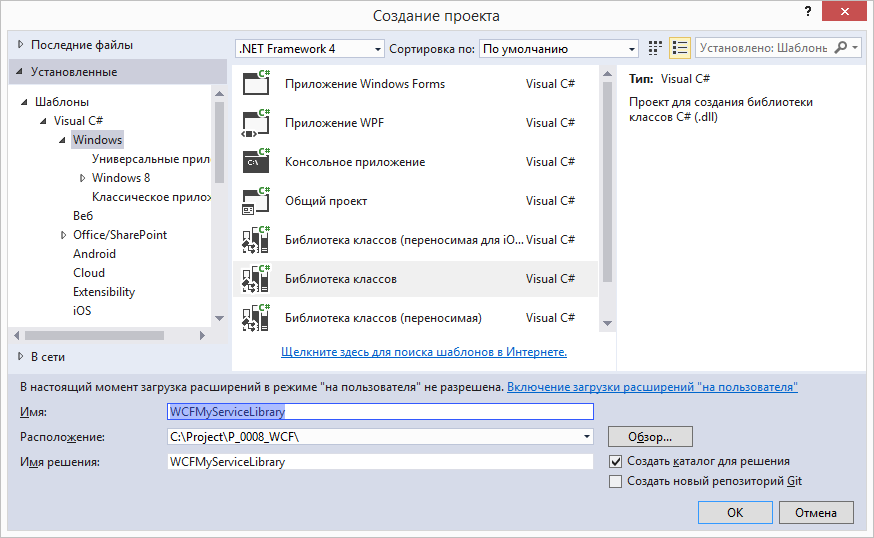
Class1.cs MyService.cs , IMyService.cs.
System.ServiceModel.
IMyService.cs :
using System.ServiceModel;
namespace WCFMyServiceLibrary
{
[ServiceContract]
public interface IMyService
{
[OperationContract]
string Method1(string x);
[OperationContract]
string Method2(string x);
}
}
MyService.cs :
namespace WCFMyServiceLibrary
{
public class MyService : IMyService
{
public string Method1(string x)
{
string s = $"1 You entered: {x} = = = 1";
return s;
}
public string Method2(string x)
{
string s = $"2 you entered: {x} = = = 2";
return s;
}
}
}
. Windows, .
(Solution) « Windows». WindowsServiceHostForMyService.
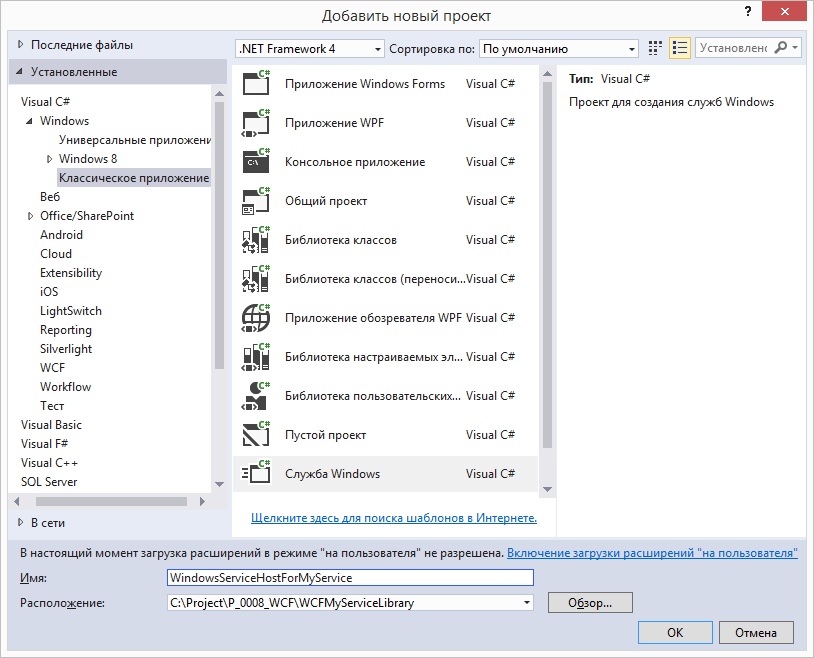
Service1.cs ( ) MyService.cs. System.ServiceModel, MyService.cs :
using System.ServiceModel;
using System.ServiceModel.Description;
MyService :
private ServiceHost service_host = null;
WCFMyServiceLibrary, :
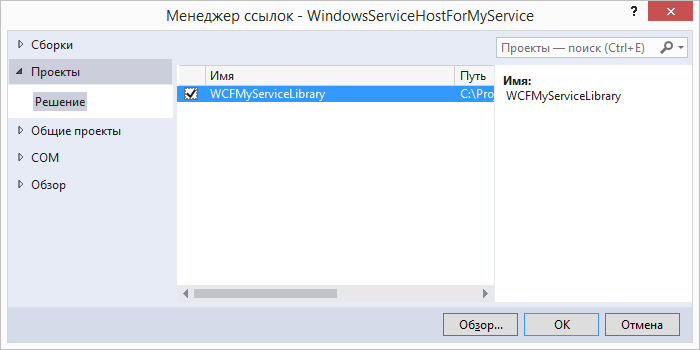
MyService OnStart , (endpoint):
OnStart
protected override void OnStart(string[] args)
{
if (service_host != null) service_host.Close();
string address_HTTP = "http://localhost:9001/MyService";
string address_TCP = "net.tcp://localhost:9002/MyService";
Uri[] address_base = { new Uri(address_HTTP), new Uri(address_TCP) };
service_host = new ServiceHost(typeof(WCFMyServiceLibrary.MyService), address_base);
ServiceMetadataBehavior behavior = new ServiceMetadataBehavior();
service_host.Description.Behaviors.Add(behavior);
BasicHttpBinding binding_http = new BasicHttpBinding();
service_host.AddServiceEndpoint(typeof(WCFMyServiceLibrary.IMyService), binding_http, address_HTTP);
service_host.AddServiceEndpoint(typeof(IMetadataExchange), MetadataExchangeBindings.CreateMexHttpBinding(), "mex");
NetTcpBinding binding_tcp = new NetTcpBinding();
binding_tcp.Security.Mode = SecurityMode.Transport;
binding_tcp.Security.Transport.ClientCredentialType = TcpClientCredentialType.Windows;
binding_tcp.Security.Message.ClientCredentialType = MessageCredentialType.Windows;
binding_tcp.Security.Transport.ProtectionLevel = System.Net.Security.ProtectionLevel.EncryptAndSign;
service_host.AddServiceEndpoint(typeof(WCFMyServiceLibrary.IMyService), binding_tcp, address_TCP);
service_host.AddServiceEndpoint(typeof(IMetadataExchange), MetadataExchangeBindings.CreateMexTcpBinding(), "mex");
service_host.Open();
}
OnStop:
protected override void OnStop()
{
if (service_host != null)
{
service_host.Close();
service_host = null;
}
}
— MyService.cs ( WindowsServiceHostForMyService) (Design Mode).
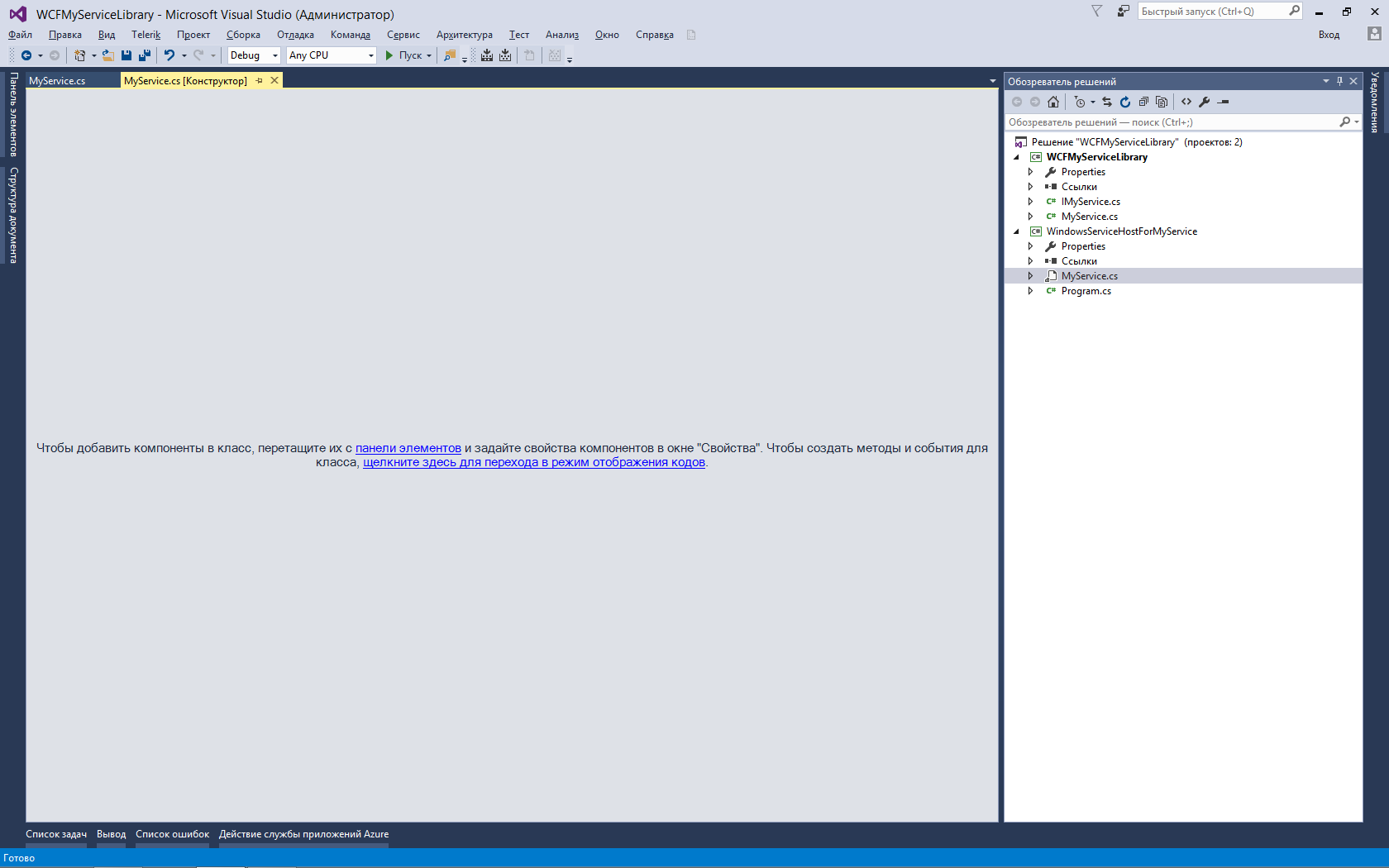
( ) « ».
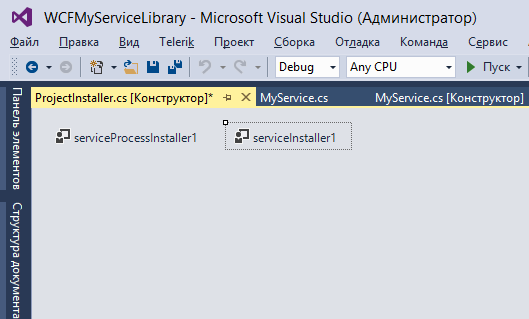
ProjectInstaller.cs
ProjectInstaller.cs MyServiceInstaller.cs.
, – «».
using System.ServiceProcess;
MyServiceInstaller:
public MyServiceInstaller()
{
// InitializeComponent();
serviceProcessInstaller1 = new ServiceProcessInstaller();
serviceProcessInstaller1.Account = ServiceAccount.LocalSystem;
serviceInstaller1 = new ServiceInstaller();
serviceInstaller1.ServiceName = "WindowsServiceHostForMyService";
serviceInstaller1.DisplayName = "WindowsServiceHostForMyService";
serviceInstaller1.Description = "WCF Service Hosted by Windows NT Service";
serviceInstaller1.StartType = ServiceStartMode.Automatic;
Installers.Add(serviceProcessInstaller1);
Installers.Add(serviceInstaller1);
}
, InitializeComponent() .
Windows . (Build Solution) – Windows.
bat- ( , Install_Windows_Service.bat) :
C:\Windows\Microsoft.NET\Framework\v4.0.30319\InstallUtil.exe WindowsServiceHostForMyService.exe
bat- , WindowsServiceHostForMyService.exe ( , , Windows).
bat-, WindowsServiceHostForMyService.exe Windows.
.
– .
«» — Service Proxy – , .
SvcUtil.exe. Generate_Proxy.bat
SvcUtil http://localhost:9001/MyService /out:MyServiceProxy.cs /config:App.config
( SvcUtil.exe C:\Program Files\Microsoft SDKs\Windows\v7.0\Bin).
, .. , Windows WindowsServiceHostForMyService.
, SvcUtil.exe 2 — MyServiceProxy.cs App.config.
, ( , App.config — ).
. ,
SvcUtil net.tcp://localhost:9002/MyService /out:MyServiceProxy.cs /config:App.config
.. , , http net.tcp.
(Solution) Windows Forms. WindowsFormsApplication1
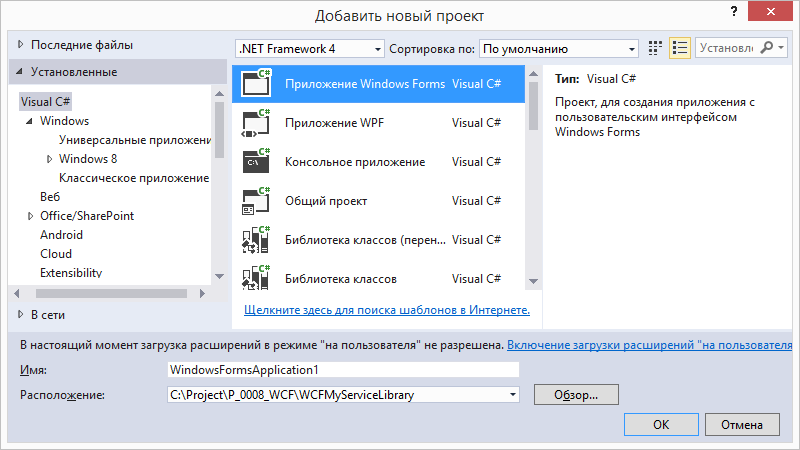
System.ServiceModel , ,
using System.ServiceModel .
MyServiceProxy.cs ( SvcUtil.exe). MyServiceProxy.cs :
namespace ServiceReference1
{
using System.Runtime.Serialization;
using System;
… MyServiceProxy.cs …
, namespace
}
, MyServiceClient ( SvcUtil.exe), .
using ServiceReference1;
MyServiceProxy.cs ( ):
namespace ServiceReference1
{
using System.Runtime.Serialization;
using System;
[System.CodeDom.Compiler.GeneratedCodeAttribute("System.ServiceModel", "3.0.0.0")]
[System.ServiceModel.ServiceContractAttribute(ConfigurationName="IMyService")]
public interface IMyService
{
[System.ServiceModel.OperationContractAttribute(Action="http://tempuri.org/IMyService/Method1", ReplyAction="http://tempuri.org/IMyService/Method1Response")]
string Method1(string x);
[System.ServiceModel.OperationContractAttribute(Action="http://tempuri.org/IMyService/Method2", ReplyAction="http://tempuri.org/IMyService/Method2Response")]
string Method2(string x);
}
[System.CodeDom.Compiler.GeneratedCodeAttribute("System.ServiceModel", "3.0.0.0")]
public interface IMyServiceChannel : IMyService, System.ServiceModel.IClientChannel
{
}
[System.Diagnostics.DebuggerStepThroughAttribute()]
[System.CodeDom.Compiler.GeneratedCodeAttribute("System.ServiceModel", "3.0.0.0")]
public partial class MyServiceClient : System.ServiceModel.ClientBase<IMyService>, IMyService
{
public MyServiceClient()
{
}
public MyServiceClient(string endpointConfigurationName) :
base(endpointConfigurationName)
{
}
public MyServiceClient(string endpointConfigurationName, string remoteAddress) :
base(endpointConfigurationName, remoteAddress)
{
}
public MyServiceClient(string endpointConfigurationName, System.ServiceModel.EndpointAddress remoteAddress) :
base(endpointConfigurationName, remoteAddress)
{
}
public MyServiceClient(System.ServiceModel.Channels.Binding binding, System.ServiceModel.EndpointAddress remoteAddress) :
base(binding, remoteAddress)
{
}
public string Method1(string x)
{
return base.Channel.Method1(x);
}
public string Method2(string x)
{
return base.Channel.Method2(x);
}
}
}
– App.Config !
3 , textBox1 ( ) richTextbox1 ( – , , )
btn_Start –
btn_Send –
btn_Close –
:
using System;
using System.ServiceModel;
using System.Windows.Forms;
using ServiceReference1;
namespace WindowsFormsApplication1
{
public partial class Form1 : Form
{
MyServiceClient client = null;
public Form1()
{
InitializeComponent();
}
private void Print(string text)
{
richTextBox1.Text += text + "\n\n";
richTextBox1.SelectionStart = richTextBox1.Text.Length;
richTextBox1.ScrollToCaret();
}
private void Print(Exception ex)
{
if (ex == null) return;
Print(ex.Message);
Print(ex.Source);
Print(ex.StackTrace);
}
private void Create_New_Client()
{
if (client == null)
try { Try_To_Create_New_Client(); }
catch (Exception ex)
{
Print(ex);
Print(ex.InnerException);
client = null;
}
else
{
Print("Cannot create a new client. The current Client is active.");
}
}
private void Try_To_Create_New_Client()
{
try
{
NetTcpBinding binding = new NetTcpBinding(SecurityMode.Transport);
binding.Security.Message.ClientCredentialType = MessageCredentialType.Windows;
binding.Security.Transport.ClientCredentialType = TcpClientCredentialType.Windows;
binding.Security.Transport.ProtectionLevel = System.Net.Security.ProtectionLevel.EncryptAndSign;
string uri = "net.tcp://192.168.1.2:9002/MyService";
EndpointAddress endpoint = new EndpointAddress(new Uri(uri));
client = new MyServiceClient(binding, endpoint);
client.ClientCredentials.Windows.ClientCredential.Domain = "";
client.ClientCredentials.Windows.ClientCredential.UserName = "Vasya";
client.ClientCredentials.Windows.ClientCredential.Password = "12345";
Print("Creating new client ....");
Print(endpoint.Uri.ToString());
Print(uri);
string test = client.Method1("test");
if (test.Length < 1)
{
throw new Exception(" ");
}
else
{
Print("test is OK ! " + test);
}
}
catch (Exception ex)
{
Print(ex);
Print(ex.InnerException);
client = null;
}
}
private void btn_Start_Click(object sender, EventArgs e)
{
Create_New_Client();
}
private void btn_Send_Click(object sender, EventArgs e)
{
Print("sending message . . .");
string s = textBox1.Text;
string x = "";
if (client != null)
{
x = client.Method1(s);
Print(x);
x = client.Method2(s);
Print(x);
}
else
{
Print("Error! Client does not exist!");
}
}
private void btn_Close_Click(object sender, EventArgs e)
{
if (client != null)
{
Print("Closing a client ...");
client.Close();
client = null;
}
else
{
Print("Error! Client does not exist!");
}
this.Close();
}
}
}
– , btn_Start, btn_Send.
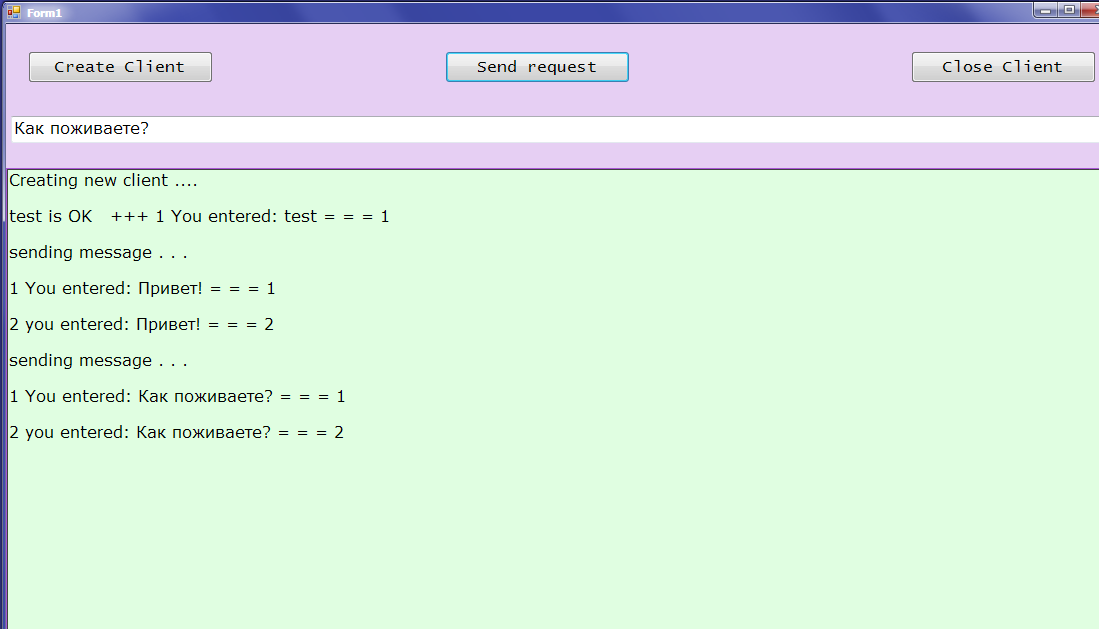
,
http://localhost:9001/MyService
net.tcp://localhost:9002/MyService
( – net.tcp , http- ).
, App.config, , C#. – – XML-, . !
. C# , C# ( Delphi MS Access).